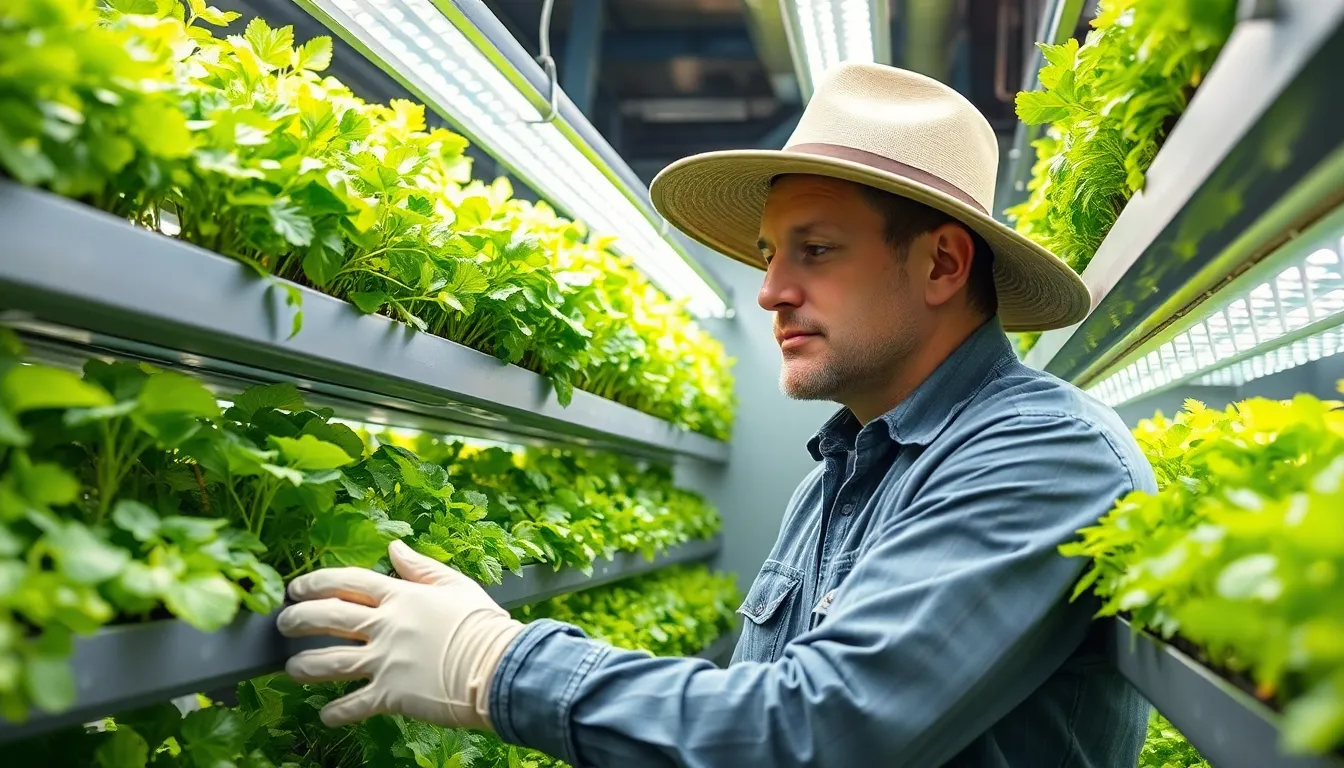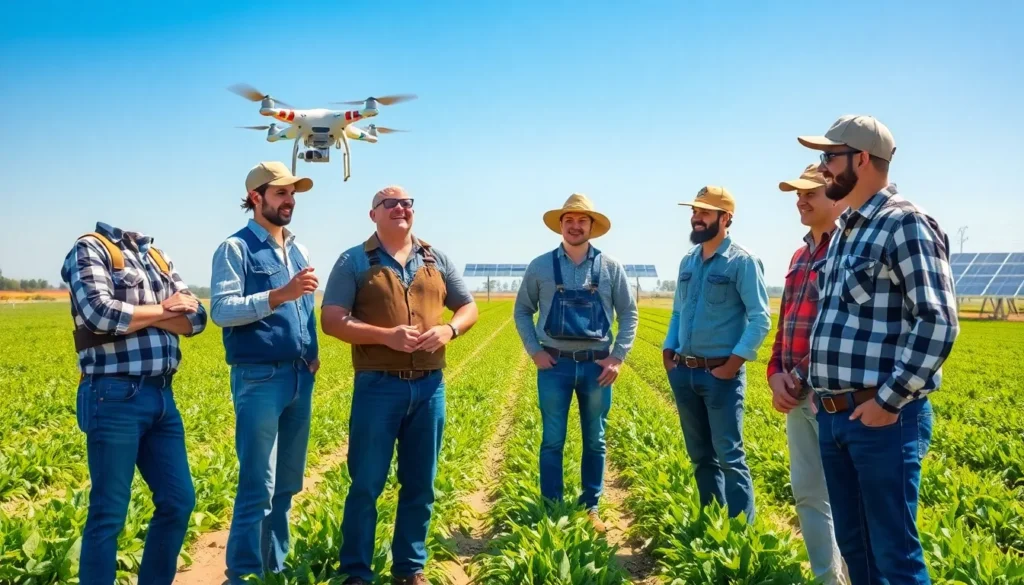In a world where the climate’s throwing tantrums and food security’s on everyone’s mind, sustainable farming technology is the superhero we didn’t know we needed. Picture this: robots planting seeds while drones deliver organic snacks to your doorstep. It sounds like a sci-fi movie, but it’s happening now. These innovations are not just cool gadgets; they’re vital tools for a greener future.
Farmers are trading in old-school methods for tech-savvy solutions that reduce waste and boost productivity. With precision agriculture, they’re not just growing crops; they’re cultivating a sustainable planet. So, buckle up as we dive into the fascinating world of sustainable farming technology, where innovation meets responsibility, and every bite counts towards a better tomorrow. Who knew saving the planet could be this exciting?
What Is Sustainable Farming Technology?
Sustainable farming technology refers to innovative practices and tools designed to enhance agricultural productivity while preserving environmental health. This technology emphasizes methods that reduce waste and reliance on chemical fertilizers and pesticides. By integrating various advancements, farmers can cultivate food in ways that minimize the ecological footprint.
Precision agriculture stands out as a vital component of sustainable farming. It utilizes data analytics and sensors to optimize crop yields and resource usage. For instance, sensors monitor soil health and moisture levels, allowing farmers to apply water and nutrients more efficiently. Drones contribute significantly as well, providing aerial imagery that identifies crop health issues early on.
Automation plays a key role too. Robotic systems can perform labor-intensive tasks, such as planting and harvesting, which reduces soil compaction and boosts efficiency. As technology evolves, these systems become more accessible, allowing even small-scale farmers to benefit.
Renewable energy integration is increasingly common. Utilizing solar panels or wind turbines on farms can reduce dependency on fossil fuels. This shift lowers greenhouse gas emissions associated with traditional farming methods.
Biotechnology also enhances sustainable farming. For example, genetically modified organisms (GMOs) can be engineered for resilience against pests or extreme weather, minimizing crop loss. Researchers are continuously exploring ways to improve crop varieties that require fewer resources while delivering higher yields.
Collectively, these technologies drive a shift towards more responsible food production. As sustainable practices gain traction, they contribute significantly to food security and environmental conservation.
Key Innovations in Sustainable Farming Technology

Innovations in sustainable farming technology play a crucial role in modern agriculture. These tools enhance productivity while maintaining ecological balance.
Precision Agriculture
Precision agriculture employs advanced technologies such as GPS and IoT devices. Data-driven insights enable farmers to monitor soil conditions and crop health in real-time. Sensor integration enhances irrigation efficiency, saving water and energy. The ability to apply fertilizers and pesticides selectively reduces chemical use and environmental impact. Crop yield optimization leads to increased profitability for farmers, aligning economic success with environmental sustainability.
Vertical Farming
Vertical farming takes crop production indoors, maximizing space through stacking layers of plants. Controlled environments allow year-round growth, irrespective of external weather conditions. Utilizing LED lighting and hydroponic systems decreases water usage significantly compared to traditional farming methods. This approach minimizes land usage and transportation emissions since farms can be located near urban centers. The potential for fresh produce in densely populated areas enhances food security while reducing carbon footprints.
Benefits of Sustainable Farming Technology
Sustainable farming technology delivers numerous advantages that positively influence both the environment and the economy. These benefits play a crucial role in shaping the future of agriculture.
Environmental Impact
Sustainable farming technology significantly reduces carbon footprints through innovative practices. Resource-efficient methods minimize the need for chemical fertilizers, lowering pollution levels in soil and water. Precision agriculture optimizes water usage via smart irrigation systems, which conserves vital water resources. The use of drones allows quick identification of crop health issues, enabling timely interventions that preserve environmental integrity. Renewable energy sources cut down on reliance on fossil fuels, thus decreasing greenhouse gas emissions. This collective approach enhances biodiversity and promotes healthier ecosystems.
Economic Advantages
Economic benefits of sustainable farming technology are substantial and far-reaching. Increased efficiency leads to higher crop yields while using fewer resources, bolstering farmer profitability. Innovative practices often reduce operational costs, which supports small-scale farmers striving for sustainability. Market demand for environmentally friendly products rises, granting farmers access to premium prices for organic and sustainably produced crops. As technology becomes more accessible, investments in automation and renewable energy offer significant long-term savings. Finally, sustainable farming practices contribute to local economies, creating jobs and supporting rural communities.
Challenges in Implementing Sustainable Farming Technology
Implementing sustainable farming technology presents numerous challenges that farmers must navigate. High initial costs often deter adoption, creating a financial barrier for small-scale farmers. Limited access to training and education complicates the integration of these advanced technologies. Many farmers lack familiarity with data analytics or GPS systems, hindering their ability to effectively utilize precision agriculture.
Additionally, varying regulatory frameworks can slow down the adoption of innovative practices. Some regions impose strict regulations that may not align with sustainable methods, creating confusion. Resistance to change is another significant obstacle; traditional farming methods are deeply rooted in many communities. Farmers may hesitate to abandon established practices, even when new technologies promise improvement.
Supply chain issues can further challenge implementation. Availability of advanced farming equipment may vary by location, limiting options. Dependence on technology also raises concerns about data privacy and cybersecurity. Farmers worried about the security of their data may resist adopting smart farming solutions.
Climate change introduces additional uncertainties. Fluctuating weather patterns complicate the successful implementation of sustainable practices, such as crop rotation or water-efficient irrigation. These environmental factors could reduce the immediacy of benefits seen from technological investment.
Collaboration among stakeholders is essential for overcoming these challenges. Support from governments, agricultural organizations, and research institutions can facilitate training programs and financial assistance. Partnerships can enhance awareness and help integrate sustainable farming practices on a larger scale. Addressing these issues requires a collective effort towards adapting and innovating for a sustainable agricultural future.
Future Trends in Sustainable Farming Technology
Advances in sustainable farming technology promise to shape agricultural practices significantly. Artificial intelligence emerges as a crucial element, enabling farmers to analyze large datasets efficiently. Data analytics aids decision-making, allowing for tailored solutions that enhance crop yields while minimizing resources.
Vertical farming continues to gain traction, utilizing limited urban spaces for maximal output. Controlled environments lead to consistent production regardless of external factors. This method reduces dependence on traditional land, making it suitable for densely populated areas.
Additionally, automation rises as robots and drones become integral to daily farming activities. These technologies streamline tasks such as planting, monitoring, and harvesting. Enhanced efficiency reduces labor costs and environmental impact, promoting sustainability across the agricultural sector.
Integrating renewable energy sources remains a focus of innovation. Solar panels and wind turbines provide clean energy to power operations, decreasing reliance on fossil fuels. The combined use of these technologies lowers overall greenhouse gas emissions.
Biotechnology advancements impact crop resilience. Genetically modified organisms offer solutions to combat pests and withstand extreme weather conditions. Higher yield potential with less resource input becomes achievable through targeted genetic improvements.
Collaboration among stakeholders will facilitate the adoption of these emerging practices. Governments and organizations must provide training, financial support, and resources to empower farmers. Focused efforts can help overcome existing barriers, promoting widespread implementation of sustainable farming technologies.
As these trends materialize, the future of agriculture will increasingly reflect a commitment to sustainability. The intersection of technology and responsible farming practices plays a pivotal role in ensuring food security and ecological health.
Sustainable farming technology represents a pivotal shift in agriculture that promises to reshape the future of food production. By leveraging innovative tools and practices, it addresses critical issues like climate change and food security while enhancing productivity. The integration of precision agriculture, automation, and renewable energy not only optimizes resource use but also fosters environmental stewardship.
As challenges persist in adopting these technologies, collaboration among stakeholders will be essential. By providing necessary support and resources, the agricultural community can overcome barriers and embrace these advancements. The commitment to sustainable farming practices will ultimately lead to a greener planet and a more secure food supply for generations to come.













